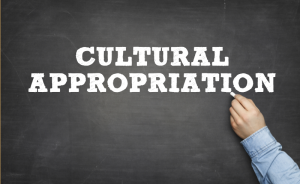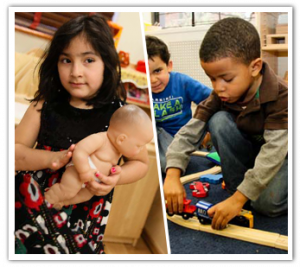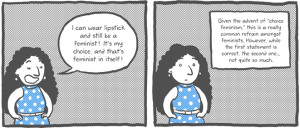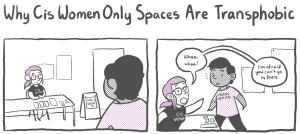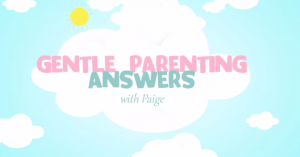Do you think I’ve got things all wrong when I criticize cultural appropriation?
Cultural appropriation is when members of a dominant group take elements of a marginalized group’s culture without honoring or understanding the true meaning of what they’re taking.
And people give lots of reasons for being skeptical about whether or not it’s oppressive.
Maybe you think you couldn’t possibly hurt anyone just by styling your hair a certain way. Maybe you think you’re honoring another group by wearing their clothing. Maybe you think everyone should share their cultures, because that’s how we learn about each other and grow as people.
I don’t believe any of these ideas justify cultural appropriation – but I do understand where they come from.
It’s easy to confuse appropriation and appreciation, because in the United States, we’re all taught some disturbing lessons that can make you think cultural appropriation is okay.
Cultural appropriation happens in the context of white supremacy. Whiteness is the dominant culture in the US, and through your lessons about other cultures and your own, whiteness is normalized.
For instance, think about the need for Black History Month.
The basic answer to the tired old question of “Why isn’t there a White History Month?” is that every month is White History Month. In school, in books, in the media, and more, we learn about white historical figures as heroes (even when their life’s work included terrorizing people of color).
So it takes having one month dedicated to Black history (and defending the need for it every February) to make sure Black heroes are remembered, too. And Native people, Asian and Pacific Islanders, Latinxs – everyone who doesn’t have the privilege of having their revolutionary heroes honored the way white historical figures are – must also fight for visibility in our collective memory of history.
Through lessons biased in favor of whiteness, all of us (but especially white Americans) are encouraged to appropriate other cultures – not appreciate them.
Stealing from oppressed groups has become normalized, so you think that’s how to appreciate another culture or harmlessly express yourself. And the pain that appropriation causes has been invisibilized, so you don’t even notice your negative impact.
I can speak to the experience of having cultural appropriation harm me. And I can tell you that it’s even harder to heal when the people get defensive and refuse to consider that they’re doing anything but “appreciating” my culture.
But you don’t have to just take my word for it.
Here are some of the ways you’ve been taught to appropriate cultures – and how you can shift your thinking to stop causing harm.
1. You’re Taught a White-Washed Version of History

How would you feel about making fun of people for having their homes invaded, their resources stolen, and their family members killed through such horrifying atrocities that they’re forced to flee their neighborhoods?
That sounds terrible. But when you’ve been taught a version of history that downplays or completely ignores these atrocities, you don’t realize that’s exactly what you’re doing with cultural appropriation.
For instance, on college campuses, at events, and in homes throughout the US, white people throw “Latin-themed” parties based on stereotypes of Latinx immigrants. One “Mexican-themed” frat party was set to include sombreros and border patrol before it was shut down.
If you feel like people were being “too PC” by ruining a night of harmless fun, consider the context of what the party-planners used to create their fun.
Common ideas say that immigrants from Latin America come to the United States for the great opportunities of the “American Dream” – and that they’re lazy, dangerous, and stealing the US’s resources.
If we were taught an accurate account of history, we’d all know how untrue these misconceptions are.
We’d know how US imperialism drives Latin American immigration, and what it really means that people are willing to risk everything to immigrate without documentation – taking the chance of being murdered by gangs along the way, killed by border vigilantes, locked up and abused in detention centers, ripped away from their families through deportation.
We could try to imagine what they’re going through, but we could never truly understand, because when you and your parents are born and raised in the US, especially if they aren’t people of color, you don’t have these violent, dehumanizing experiences.
And if you knew all this – if you truly respected Latinx immigrants as human beings – you’d never see a party where white Americans mock and trivialize their harrowing struggles as an example of harmless fun.
2. You’re Taught that Your Self-Expression Matters Most (No Matter Who Gets Hurt)
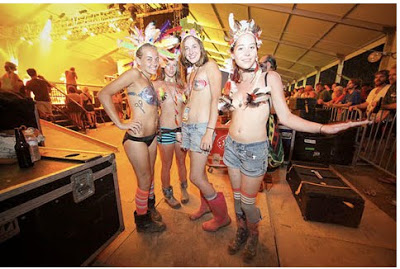
Self-expression is important to me. So I cringe when people think criticizing cultural appropriation means I’m limiting self-expression and personal choice.
Many people think non-Native people should be able to express themselves by wearing a Native headdress at a music festival – without any knowledge or respect for what that sacred symbol means to the people it came from.
Can you spot the big problem with this approach to freedom of choice? It encourages people to make choices that oppress other people.
Think about how freedom of choice has been violently denied to marginalized groups like Native people.
Ever since European colonizers came to occupy this land, Native people have been subject to oppressive laws, policies, and stereotypes that perpetuate the idea that their traditions are savage and uncivilized. They’ve had to fight to maintain their culture.
And then non-Native people take the sacred symbols Native people have fought to keep – like a headdress – and reduce them to trivial fashion statements to pass around at festivals. White people wear the headdress – an act that must be earned in Native tribes – and make it part of a sexualized, Western ideal of beauty.
Compare your freedom to sexualize such a sacred symbol with the experiences of Native women, who are two-and-a-half times more likely to be sexually assaulted than any other woman in the United States.
Compare your freedom to do whatever you find “fun” with the experiences of Native students forced to cut their hair and stop using indigenous languages. Freedom of self-expression is a privilege they don’t have.
Saying “I can do whatever I want” is an expression of entitlement, not freedom.
Lots of white folks act on their privilege by wearing headdresses, even though countless people have spoken up about why that’s a harmful thing to do.
But with an intersectional feminist approach to self-expression, you can think about your impact on others and choose to express yourself in a way that doesn’t hurt marginalized people.
3. You’re Taught to See People of Color as Stereotypes and Our Cultures as Costumes

You try to avoid hurting people, right? Part of the problem with cultural appropriation is that you’ve been taught not to see people of color as people at all, much less people whose feelings matter.
That seems absurd – of course you know that people of color are people.
You’re not responsible for all of the ways society dehumanizes them, but like everyone else, your worldview is influenced by the many toxic messages you get throughout your life.
In popular movies and TV shows, for instance, you get a variety of white characters – heroes, villains, supporting cast members, and everything in between.
In general, movies and television aren’t exactly accurate reflections of reality, but at least white actors can play diverse and unique roles – which is good because, just like every racial group, white folks are all unique people.
Actors of color don’t have the same opportunities. There are limited roles available to them, and the roles that are available are often insignificant or degrading.
So when you watch TV, you get images of Black men as one-dimensional sidekicks, as dangerous criminals, or as totally invisible. These common images influence your perception of what it means to be a Black man.
You don’t associate the images with real human beings who can be hurt. You don’t grasp the true significance of things like slang and sagging pants, or understand that this culture goes far beyond those things.
You don’t know the real reasons why a Black man would choose to express himself in the style you read as “thuggish,” because you’re only seeing the whole depth of his humanity reduced to a stereotypical image.
Then, by the time Halloween comes around, you see nothing wrong with dressing up like a “thug,” having a laugh at the expense of the dehumanized versions of real people.
Except that you affect real people when you perpetuate these images.
Stereotypical representations make it easier for you to overlook the pain of children like Trayvon Martin, who was gunned down after being perceived as a dangerous criminal, and mocked by costumes after his death. And of Black men whose connection to hip-hop culture helps them survive poverty and discrimination.
There are real, breathing people whose culture is vastly misunderstood and misrepresented, and when you perpetuate harmful stereotypes about them, you contribute to their struggles.
4. You’re Taught That Racism Only Includes Something Much More Sinister than Appropriation
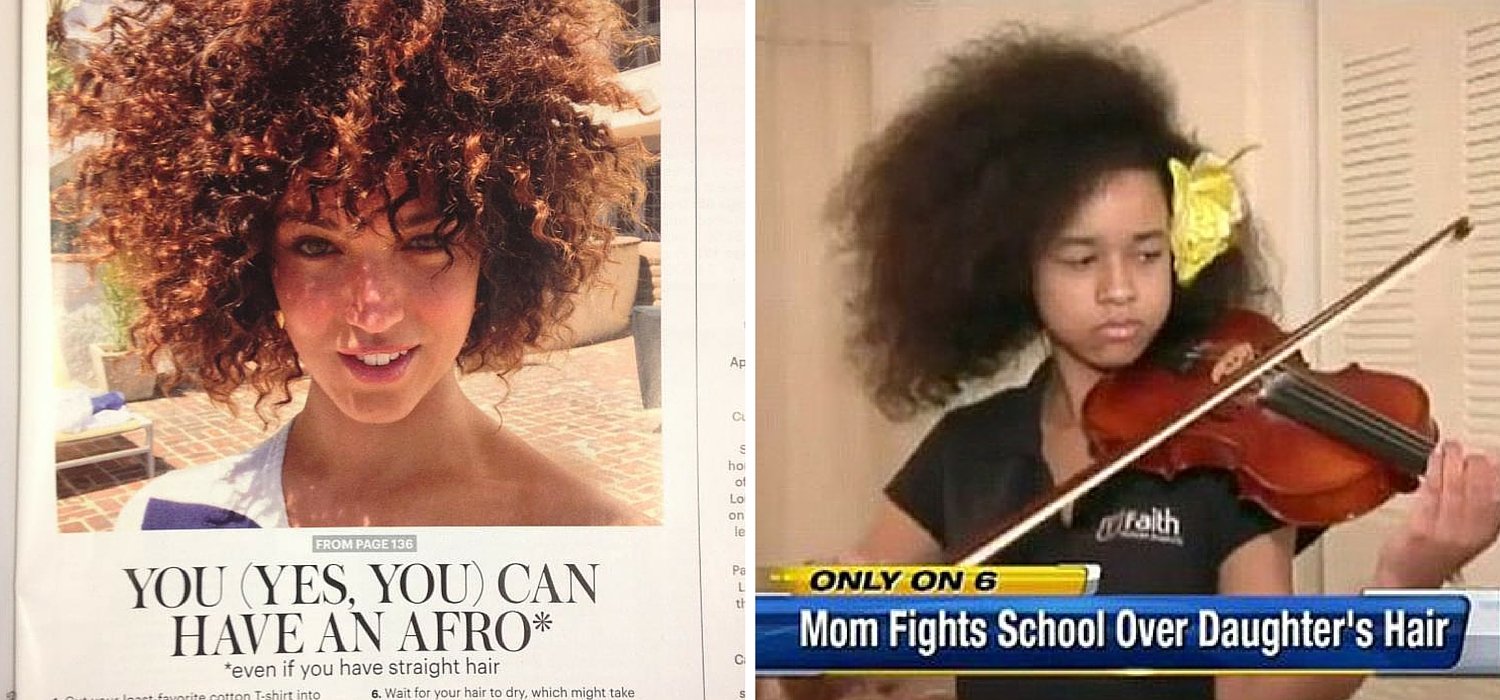
Does cultural appropriation really matter, in the grand scheme of things? Compared to being a violent racist who kills, assaults, or harasses people of color, being a white person who appropriates something like a hairstyle is pretty meaningless, right?
Cultural appropriation does matter. Obviously, there are more damaging examples of racism – you don’t have to remind people of color that.
I’m aware of all of the terrifying ways racism appears, and that’s exactly why I’m calling for you to stop the everyday ways you help perpetuate it.
Racism is systemic – which means it’s bigger than any one person’s actions. The system is active because we all keep it going, even in small, seemingly insignificant ways.
If you think you couldn’t possibly contribute to the system of anti-Black racism just by wearing a traditionally Black hairstyle, think again.
Say you buy a magazine like Allure and follow what seems to be a hot new trend of white women with “afros.” You’re acting on a double standard and feeding into a Eurocentric ideal of beauty. You’re participating in a system that says Black women’s natural hair is unappealing, but white women can look cool and attractive when they imitate it.
Because while your afro is treated as “trendy,” a little Black girl was bullied for wearing her hair naturally, and her school responded by threatening to expel her if she didn’t change her hair.
And people are laughing at Blue Ivy Carter, saying her parents Jay-Z and Beyoncé need to comb her hair.
And dress codes in workplaces throughout the country demand that Black women put time and money into straightening their hair in order to keep their jobs.
So yes, imitating, mocking, or claiming to have invented Black women’s traditional hairstyles does contribute to racism.
It’s part of the system that shames Black girls from infancy, treating them as inferior to white girls and continuing to discriminate against them as Black women. The same system allows white people to exploit our traditions for fun, attention, and profit.
There are lots of seemingly small ways you can pay attention to this system and avoid participating in it.
Being able to say “I’m not a member of the KKK” does not exactly make you a champion of racial justice. If you dig a little deeper, you’ll find that there’s a lot more you could do, including avoiding cultural appropriation.
5. You’re Taught That Your Intentions Matter More than Your Impact
If someone points out that you’ve appropriated another culture, you might feel the urge to defend yourself by saying what you meant to do.
“But I didn’t mean to be racist!” “But I’m honoring your culture.” “But I didn’t even know it was appropriation – aren’t you being a little too sensitive?”
None of these things erase the harmful impact of cultural appropriation. Many people appropriate culture without malicious intentions.
But you can hurt someone without meaning to, and when it comes to causing harm, the negative impact is what counts.
If impact didn’t matter, I’d be quite the killjoy ruining everyone’s fun for no reason, right?
What the hell, maybe I’m a killjoy anyway – because I’m saying that even when people incorporate cultural appropriation into their lives for “positive” reasons, they can cause the kind of harm that really needs to stop.
For instance, some people use appropriation in their wedding ceremonies. One white couple’s weddings are based entirely around other people’s cultures.
That’s plural – weddings – because they’re traveling the world and touring wedding traditions, with dozens of ceremonies so far. A collection of cultural appropriation, if you will.
They’ve got all kinds of positive reasons for doing this – for love, for adventure, for curiosity (and now for their “global” wedding business). I can’t hate on their motivations.
But there are consequences of treating other people’s traditions as whimsical, one-time party favors.
For one thing, they trivialize these deep traditions by using them once and discarding them without any connection to the culture. They objectify and fetishize the people they’re borrowing from. Many of their blog posts and pictures depict other cultures’ traditions as strange and silly, inviting other white and Western people to gawk with them.
They don’t mean to have this impact, I’m sure. And maybe it’s not their fault if someone else takes what they’re doing to justify their own xenophobic ideas.
But to avoid causing harm, they’d have to consider the unintended consequences and find a way to celebrate their love with dabbling in others’ traditions.
6. You’re Taught That This Is the Only Way to Appreciate Other Cultures

Many intentions for appropriation are completely the opposite of causing harm.
You’re fascinated by other cultures and you’d like to appreciate them. You respect another ethnic group and you’d like to honor their traditions. You want to build understanding between people, and so you’re putting yourself in someone else’s shoes.
You think avoiding appropriation means keeping people segregated, and missing opportunities to learn from each other.
Everything from tourist industries to the fashion world to our history lessons tell us that we can connect with people who are different from us by invading their space, picking the parts of their culture that we like, and claiming them as our own.
Well, if you’re interested in appreciating other cultures, then you’ll want to know that appropriation is an awful way of going about it. Appropriation doesn’t show appreciation at all – it lets you get something out of taking from someone else’s culture, rather than sharing a mutually beneficial exchange.
If you don’t know or care about the potentially negative impact of what you’re doing, how can you really show appreciation?
There are ways to show appreciation for other cultures without causing harm.
You could compliment a hairstyle instead of copying it. You could give financial support to people working to keep their traditions alive through events, art, and activism. You could read what marginalized people have to say about what they need to feel supported, instead of ostracized.
And a really great way to show respect is to listen when marginalized people tell you that one of their traditions is off-limits. Trivializing our culture for your own entertainment contributes to oppression, not appreciation.
New Lessons to Learn From
These oppressive lessons are insidious, showing up everywhere from our educational systems to our most popular media. They’re ingrained in us throughout our entire lives, so it takes work to unlearn them.
Understanding cultural appropriation is complicated, and it’s possible to make mistakes.
But you’re already on your way to understanding.
By unpacking how you’ve learned to appropriate other cultures, you can be thoughtful about how to appreciate them instead.
Pay attention to the messages you’re getting about how to treat other people, and you’ll notice when white supremacy’s rearing up to dehumanize them.
Consider the context of what you’re doing to know if you’re contributing to someone’s oppression by doing it.
Listen to marginalized people speaking about their struggles, to understand if your everyday actions are part of the problem.
You could learn much more accurate, enriching, and respectful lessons about other people by rejecting the toxic messages you get from the status quo. Let’s create a new norm of respect for one another’s cultures.
[do_widget id=’text-101′]
Maisha Z. Johnson is the Digital Content Associate and Staff Writer of Everyday Feminism. You can find her writing at the intersections and shamelessly indulging in her obsession with pop culture around the web. Maisha’s past work includes Community United Against Violence (CUAV), the nation’s oldest LGBTQ anti-violence organization, and Fired Up!, a program of California Coalition for Women Prisoners. Through her own project, Inkblot Arts, Maisha taps into the creative arts and digital media to amplify the voices of those often silenced. Like her on Facebook or follow her on Twitter @mzjwords.
Search our 3000+ articles!
Read our articles about:
Our online racial justice training
Used by hundreds of universities, non-profits, and businesses.
Click to learn more
Most Read Articles
- « Previous
- 1
- …
- 30
- 31
- 32


